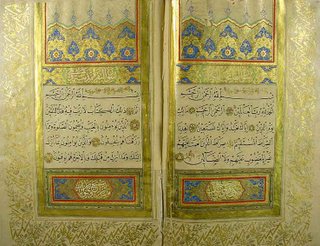
Name : This Surah is named Al-Fatihah because of its subject matter. The first surah of the Qur'an's 114. Fatihah is that which opens a subject, a book, or any other thing. In other words, Al-Fatihah is a sort of preface.It is also known as Ummul Qur'an.
Period of Revelation : It is one of the very earliest Revelations to the Holy Prophet. In fact, we learn from authentic Traditions that it was the first complete Surah which was revealed to Muhammad [Allah's peace be upon him]. Before this, only a few miscellaneous verses were revealed which form parts of `ALAQ, MUZ-ZAMMIL, MUD-DATH-THIR, etc.
Theme : This Surah is in fact a prayer which Allah has taught to all those who want to make a study of His book. It has been placed at the very beginning of the book to teach this lesson to the reader: if you sincerely want to benefit from the Quran, you should offer this prayer to the Lord of the Universe.
This preface is meant to create a strong desire in the heart of the reader to seek guidance from the Lord of the Universe, Who alone can grant it. Thus Al-Fatihah indirectly teaches that the best thing for a man is to pray for guidance to the straight path, to study the Quran with the mental attitude of a seeker- after-truth and to recognize the fact that the Lord of the Universe is the source of all knowledge. He should, therefore, begin the study of the Quran with a prayer to him for guidance.
From this theme, it becomes clear that the real relation between Al-Fatihah and the Quran is not that of an introduction to a book but that of a prayer and its answer. Al-Fatihah is the prayer from the servant and the Quran is the answer from the Master to his prayer. The servant prays to Allah to show him guidance and the Master places the whole of the Quran before him in answer to his prayer, as if to say, "This is the Guidance you begged from Me."
The translations of the Surah Al-Fatihah are as follows:
[i.] In the Name of Allah, the Most Gracious, the Most Merciful
[ii.] All the praises and thanks be to Allah, the Lord [1] of the ‘Alamin [mankind, jinn and all that exists]. [2]
[iii.] The Most Gracious, the Most Merciful.
[iv.] The Only Owner [and the Only Ruling Judge] of the Day of Recompense [i.e. the Day of Resurrection]
[v.] You [Alone] we worship, and You [Alone] we ask for help [for each and everything].
[vi.] Guide us to the Straight Way. [3]
[vii.] The Way of those on whom You have bestowed Your Grace[4] , not [the way] of those who earned Your Anger [i.e. those who knew the Truth, but did not follow it] nor of those who went astray [i.e. those who did not follow the Truth out of ignorance and error]. [5],[6]
_________________________________________________________
[1] [V.1:2] Lord: The actual word used in the Qur’an is Rabb There is no proper equivalent for Rabb in English . It means the One and the Only Lord for the entire universe, its Creator, Owner, Organizer, Provider, Master, Planner, Sustainer, Cherisher, and Giver of security. Rabb is also one of the Names of Allah. We have used the word "Lord" as the nearest to Rabb. All occurrences of "Lord" in the interpretation of the meanings of the Noble Qur’ân actually mean Rabb and should be understood as such.
[2] [V.1:2]. Narrated Abu Sa‘îd bin Al-Mu‘alla: While I was praying in the mosque, Allah’s Messenger s.a.w called me but I did not respond to him. Later I said, "O Allâh’s Messenger, I was praying." He said, "Allah say - Answer Allah [by obeying Him] and His Messenger when he s.a.w calls you." [V.8:24]. He then said to me, "I will teach you a Surah which is the greatest Surah in the Qur’an, before you leave the mosque." Then he got hold of my hand, and when he intended to leave [the mosque], I said to him, "Didn’t you say to me, "I will teach you a Surah which is the greatest Surah in the Qur’an?" He said, " Al-Hamdu lillahi Rabbil-‘alamîn [i.e. all the praises and thanks be to Allâh, the Lord of the ‘Alamîn [mankind, jinn and all that exists)], Surah al-Fatihah which is As-Sab‘Al-Mathaani [i.e. the seven repeatedly recited Verses) and the Grand Qur’an which has been given to me." [Sahih Al-Bukhâri, Vol.6, Hadîth No. 1].
[3] [V.1:6] Guidance is of two kinds:
[a] Guidance of Taufîq is totally from Allah alone, i.e. Allâh would open up one’s heart to recognise and accept the truth [from disbelief to faith in Islamic Monotheism].
[b] Guidance of Irshad i.e. through preaching by Allâh’s Messengers and the pious preachers who preach the truth of Islamic Monotheism.
[4] [V.1:7] It is the way of the Prophets, the Siddîqun [i.e. those followers of the Prophet, who were first and foremost to believe in him, like Abu Bakr As-Siddîq], the martyrs and the righteous, [as Allah s.w.t said: "And who so obeys Allâh and the Messenger [Muhammad s.a.w], then they will be in the company of those on whom Allâh has bestowed His Grace, of the Prophets, the Siddîqûn, the martyrs, and the righteous. And how excellent these companions are!" [V.4:69].
[5] [V.1:7]: Narrated ‘Ubadah bin As-Samit that Allâh’s Messenger s.a.w said, "Whoever does not recite Surat Al-Fatihah in his prayer, his prayer is invalid. [Sahih Al-Bukhâri, Vol.1, Hadîth No. 723].
[6] [V.1:7]: Narrated Abu Hurairah: Allah’s Messenger s.a.w said, "When the Imam says: Ghairi l-maghdhubi ‘alaihim Walad-dhallin [i.e. not the way of those who earned Your Anger, nor the way of those who went astray (1:7)], then you must say, Amiin, for if one’s utterance of Amiin coincides with that of the angels, then his past sins will be forgiven." [Sahih Al-Bukhâri, Vol.6, Hadîth No. 2].
No comments:
Post a Comment